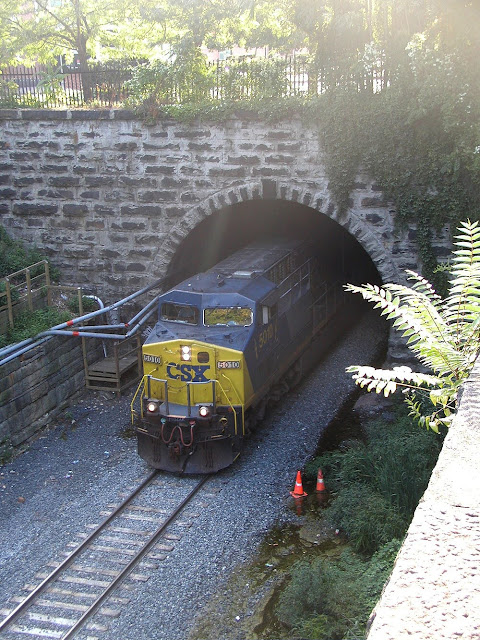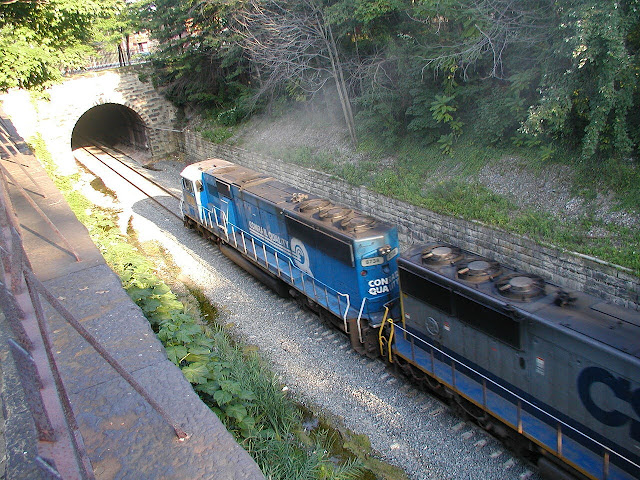When I first started grad school in Baltimore I managed to secure a low cost apartment about half a block away from the Baltimore Belt Line, the 1890's link between the B&O's original network and a new expansion t Philadelphia. Known for being the site of the first main line railroad electrification in the world, it features stiff grades and several tunnels to get trains from sea level at Camden Yards up to the more inland elevations. For the first few months I was there and before the novelty eventually wore off, I would use my scanner to get just enough advance warning of approaching trains to run the cut and grab some photos. The following set of photos ( mirror ) covers this period of time.
So something I didn't notice for years was the prevalence of CSX AC6000 locomotives on whatever "service lane" the Philly Sub was a part of. Ultimately part of a failed Y2K era fad in super horsepower diesels, CSX came away with the largest fleet of full power AC6000's with 117 units. At the time they looked like every other bland GE AC4400 or C4x-9W so I just filed them under "typical GE" and only noticed all the photos of them years later when I was reviewing my old photos. Here #5001 emerges from the Calvert St tunnel and into the cut between St. Paul and Charles streets. CSX #5011 also happened to sport a special "diversity" scheme, which in typical CSX fashion consisted of a rather minimalist patch on each side of the long hood.
This was also the tail end of the era when standard cab -2 era engines
were regularly seen on road freights. Behind #5001 was lease BN SD40-2
#8161 and CSX SD40-2 #8055.
The very next train I managed to get a photo of was also led by an AC6000, in this case #688. If one is unable to look up the roster, one can tell the difference by the larger radiator, twin stack exhaust and yellow long hood CSX lettering outlined in blue. Behind #688 was a fairly new AC4400 #75 still in its original livery with a gray long hood and blue lettering.
As this was only 4 years removed from the Conrail break-up, it was still possible to catch Conrail painted locomotives in the wild, such as SD60I #8722. The small batch of "whisper cab" SD60I's were loved by crews, but were ultimately excessed by both CSX and NS.
Adjacent to HUNTINGDON AVE interlocking and its B&O CPL's, were a bunch of rusting box cars that had been involved in the Howard Street tunnel fire of 2001 and had yet to be removed/scrapped due to ongoing insurance litigation.
I also got my first taste of the Baltimore Light Rail, walking over the bridge to the North Ave station. This was also when I became aware of the Baltimore Streetcar museum by literally seeing it from said North Ave bridge.
Looking down onto the NEC from the same bridge, one could still observe the remains of the old freight gauntlet track on track #3 just north of the B&P Tunnel.
Back on the Belt Line I caught a third AC6000, #5010, along with Conrail painted SD60I #8754 following behind. Note the amount of diesel exhaust pouring out of the Huntingdon Ave tunnel. I wasn't exaggerating about the significance of the Belt Line grades and often times long coal trains would be moving barely faster than a walk.
Conrail SD60I #8738 equalizes the number of sightings for that type and AC6000's at three a piece.
Team AC6000 takes the lead again with #637 followed by C40-8W #7861. I recall how generic the C49-8's seemed at the time before I realized they used the wavy E60 type trucks.
The next movement I caught was even stranger. GP's38-2 leaders #2651 and #2523 were trailed by C's40-8W #7800 and #7912 and gray ghost painted GP38-2 #2507. The train was getting an Approach Medium indication on the westbound HUNTINGDON AVE B&O CPl dwarf signal indicating either a stop or slow speed signal at HB TOWER near Camden Yards.
This was followed by the 4th AC6000 of the set, #5014, with C40-8W #7321 running behind.
To wrap the set up here are photos of CSX SD40-2 #8515, along with Conrail panted SD40-2 #8647 ahead of a Chessie System box car, taking a Clear signal at HUNTINGDON AVE.
Despite all of these in hindsight amazing catches, the process of spending evenings and weekends next to the scanner waiting to spring out of my apartment on a moment's notice with a camera in hand began to wear thin and it wasn't long before Belt Line movements became a thing I would only occasionally catch on my way to or from somewhere else. Unfortunately in the age before high quality mobile device cameras, most of these trains went undocumented.

























No comments:
Post a Comment